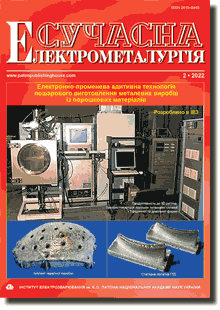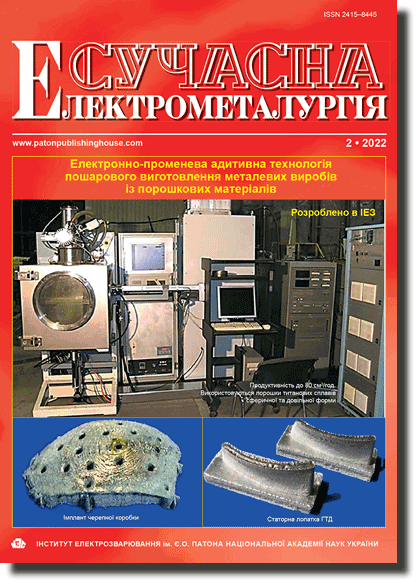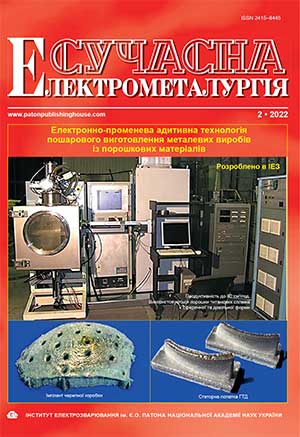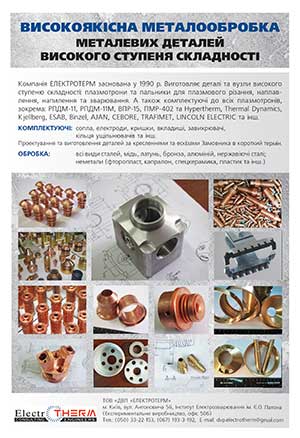| 2022 №02 (07) |
DOI of Article 10.37434/sem2022.02.01 |
2022 №02 (02) |

"Suchasna Elektrometallurgiya" (Electrometallurgy Today), 2022, #2, 3-9 pages
Producing high-temperature titanium alloys of Ti–Al–Zr–Si–Mo–Nb–Sn system by electron beam melting
S.V. Akhonin1, V.O. Berezos1, O.M. Pikulin1, A.Yu. Severyn1, O.O. Kotenko1, M.M. Kuzmenko2, L.D. Kulak2, O.M. Shevchenko2
1E.O. Paton Electric Welding Institute of the NAS of Ukraine. 11 Kazymyr Malevych Str., Kyiv, 03150, Ukraine. E-mail: office@paton.kiev.ua
2I.M. Frantsevich Institute for Problems of Materials Science of the NAS of Ukraine. 3 Acad. Krzhyzhanovskyi Str., 03142, Kyiv, Ukraine. E-mail: rapid@materials.kiev.ua
Abstract
A complex of research work was performed on the base of EBM technology to produce high-strength complex-alloyed titanium alloys of Ti‒Al‒Zr‒Si‒Mo‒Nb‒Sn system with silicon content, higher than the thermodynamically stable value in the solid solution. Alloys of this system are promising for creation of a new class of materials with a high level of heatresistant characteristics. It is shown that EBM allows producing ingots of high-temperature titanium alloys of Ti‒Al‒Zr‒ Si‒Mo‒Nb‒Sn system, which are characterized by sufficient chemical homogeneity and absence of casting defects. It is found that tin presence lowers silicon solubility in the test alloys and intensifies silicide release. Here the structure is also refined. It is found that additional alloying elements influence silicon solubility in titanium, forming complex silicides of (Zr, Ti)5Si (Ti, Zr)3Si type in the test alloys. It is shown that the microstructure of the test cast alloys consists of platelike α-phase packets within primary β-grains, having different crystallographic orientation. Ref. 18, Fig. 8. Key words: high-temperature titanium alloy; ingot; electron beam melting; technological modes; chemical composition; cast metal; structure
Received 13.04.2022
References
1. Garmata, V.A., Petrunko, A.N., Galitsky, N.V. et al. (1983) Titanium. Moscow, Metallurgiya [in Russian].2. Khorev, A.I., Khorev, M.A. (2005) Titanium alloys, their application and prospects of development. Materialovedenie, 7, 25-34 [in Russian].
3. Khorev, A.I. (2007) Theory and practice of producing of titanium alloys for prospective structures. Tekhnologiya Mashinostroeniya, 12, 5-13 [in Russian].
4. Antonyuk, S.L., Molyar, A.G., Kalinyuk, A.N. et al. (2003) Titanium alloys for aircraft industry of Ukraine. Sovrem. Elektrometal., 1, 10-14 [in Russian].
5. Babenko, E.P., Dolzhenkova, E.V. (2014) Examination of fracture causes of VT23 alloy large-sized product. Metallurgicheskaya i Gornorudnaya Promyshlennost, 3 , 82-85 [in Russian].
6. Iliin, A.A., Kolachev, B.A., Polkin, I.S. (2009) Titanium alloys. Composition, structure, properties: Handbook. Moscow, VILS-MATI [in Russian].
7. Firstov, S.O. (2004) New generation of titanium-based materials. In: Fracture mechanics of materials and strength of structures. Ed. by V.V. Panasyuk. Lviv, PMI, 609-616 [in Ukrainian].
8. Wu, T., Beaven, Р., Wagner, R. (1990) The Ti3(Al, Si)-Ti5(Si, Al)3 eutectic reaction in the Ti-Al-Si system. Scripta Metallurgica, 24, 207-212. https://doi.org/10.1016/0956-716X(90)90593-6
9. Salpadoru, H.H., Flower, H.М. (1995) Phase equilibria and transformations in a Ti-Zr-Si system. Metall. Mater. Transact., 26A(2), 243-257. https://doi.org/10.1007/BF02664663
10. Kuzmenko, M.M. (2008) Structure and mechanical properties of cast alloys of Ti-Si system. Fizyko-Khimichna Mekhanika Materialiv, 44(1), 45-48 [in Ukrainian]. https://doi.org/10.1007/s11003-008-9042-x
11. Firstov, S.O., Kulak, L.D., Kuzmenko, M.M., Shevchenko, O.M. (2018) Ti-Al-Zr-Si system alloys for high temperature operation. Ibid., 54(6), 30-35 [in Ukrainian]. https://doi.org/10.1007/s11003-019-00264-5
12. Paton, B.E., Trigub, N.P., Akhonin, S.V., Zhuk, G.V. (2006) Electron beam melting of titanium. Kyiv, Naukova Dumka [in Russian].
13. Akhonin, S.V., Severin, A.Yu., Berezos, V.A. et al. (2016) Peculiarities of melting of titanium alloy VT19 ingots in electron beam cold hearth installation. Sovrem. Electrometall., 2, 23-27 [in Russian]. https://doi.org/10.15407/sem2016.02.03
14. Akhonin, S.V., Pikulin, A.N., Berezos, V.A. et al. (2019) Laboratory electron beam unit UE-208M. Ibid., 3, 15-22 [in Russian]. https://doi.org/10.15407/sem2019.03.03
15. Akhonin, S.V., Firstov, S.A., Severin, A.Yu. et al. (2019) Electron beam melting of heat-resistant titanium composites of Ti-Si-Al-Zr-Sn. Ibid., 2, 7-12 [in Russian]. https://doi.org/10.15407/sem2019.02.02
16. (2000) State diagrams of binary metallic system: Handbook, Vol. 3. Ed. by N.P. Lyakishev. Moscow, Mashinostroenie [in Russian].
17. Shevchenko, O.M., Kulak, L.D., Kuzmenko, M.M., Firstov, S.O. (2020) Influence of zirconium alloying on structure and hardness of quenched cast biocompatible Ti-18Nb-1Si alloy. Metalofizyka i Novitni Tekhnologii, 42(2), 237-249 [in Ukrainian]. https://doi.org/10.15407/mfint.42.02.0237
18. Solonina, O.P., Glazunov, S.G. (1976) Titanium alloys. Heat-resistant titanium alloys. Moscow, Metallurgiya [in Russian].
Advertising in this issue:
The cost of subscription/purchase order journals or individual articles
| Journal/Currency | Annual Set | 1 issue printed |
1 issue |
one article |
| TPWJ/USD | 384 $ | 32 $ | 26 $ | 13 $ |
| TPWJ/EUR | 348 € | 29 € | 24 € | 12 € |
| TPWJ/UAH | 7200 UAH | 600 UAH | 600 UAH | 280 UAH |
| AS/UAH | 1800 UAH | 300 UAH | 300 UAH | 150 UAH |
| AS/USD | 192 $ | 32 $ | 26 $ | 13 $ |
| AS/EUR | 180 € | 30 € | 25 € | 12 € |
| SEM/UAH | 1200 UAH | 300 UAH | 300 UAH | 150 UAH |
| SEM/USD | 128 $ | 32 $ | 26 $ | 13 $ |
| SEM/EUR | 120 € | 30 € | 25 € | 12 € |
| TDNK/UAH | 1200 UAH | 300 UAH | 300 UAH | 150 UAH |
| TDNK/USD | 128 $ | 32 $ | 26 $ | 13 $ |
| TDNK/EUR | 120 € | 30 € | 25 € | 15 € |
AS = «Automatic Welding» - 6 issues per year;
TPWJ = «PATON WELDING JOURNAL» - 12 issues per year;
SEM = «Electrometallurgy Today» - 4 issues per year;
TDNK = «Technical Diagnostics and Non-Destructive Testing» - 4 issues per year.








